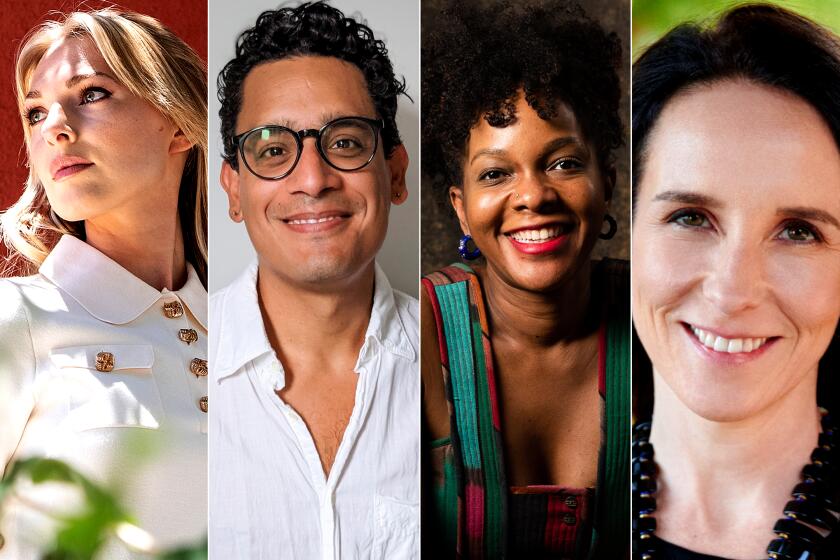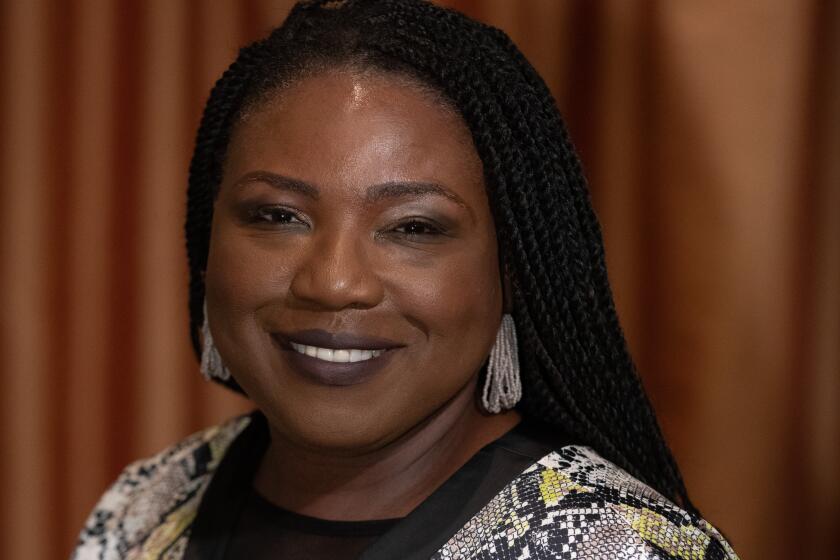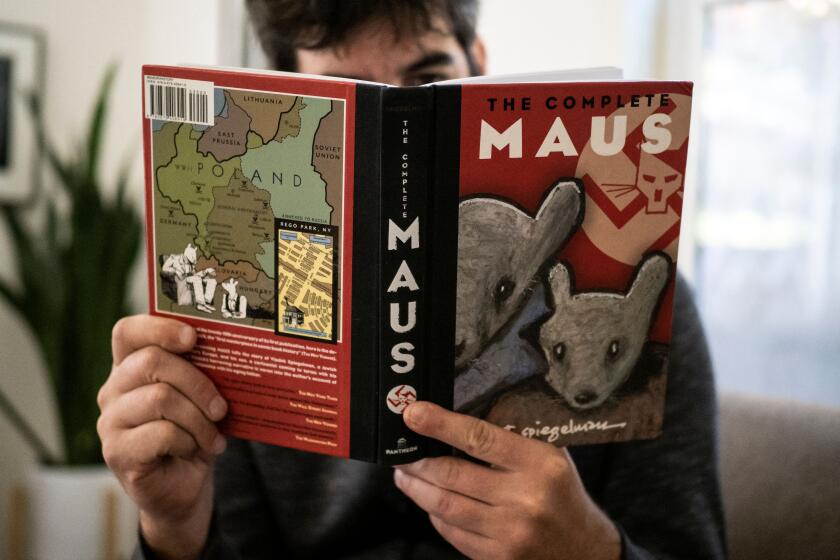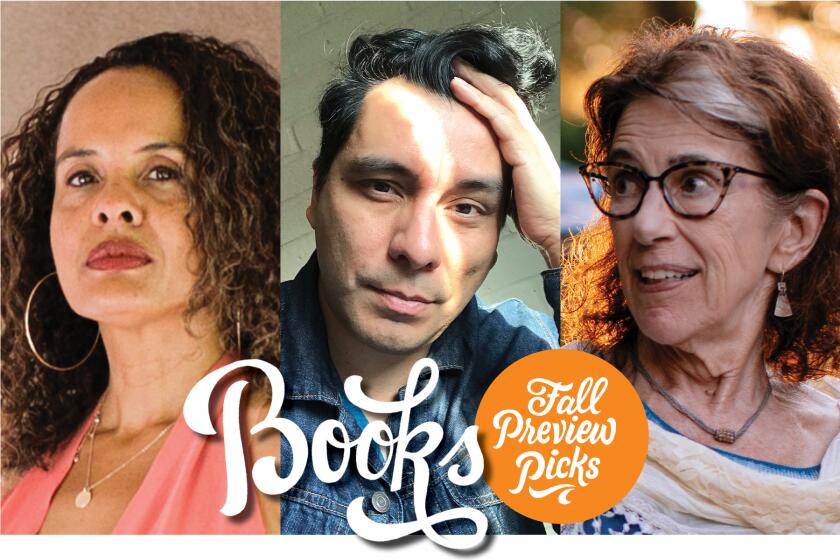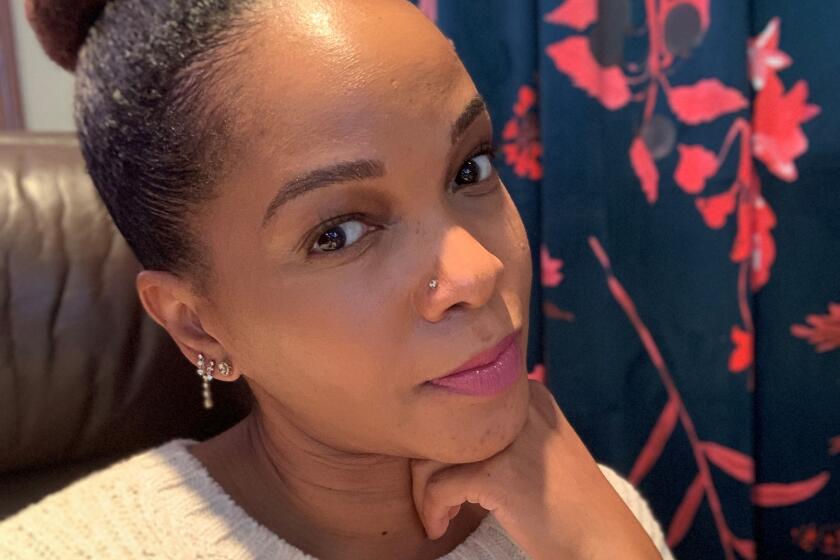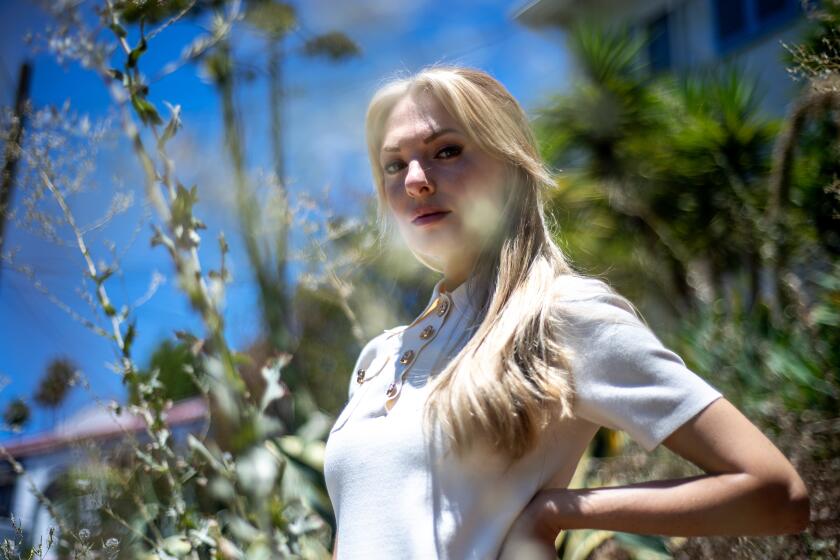L.A.’s Tess Gunty, Imani Perry among winners of 2022 National Book Awards
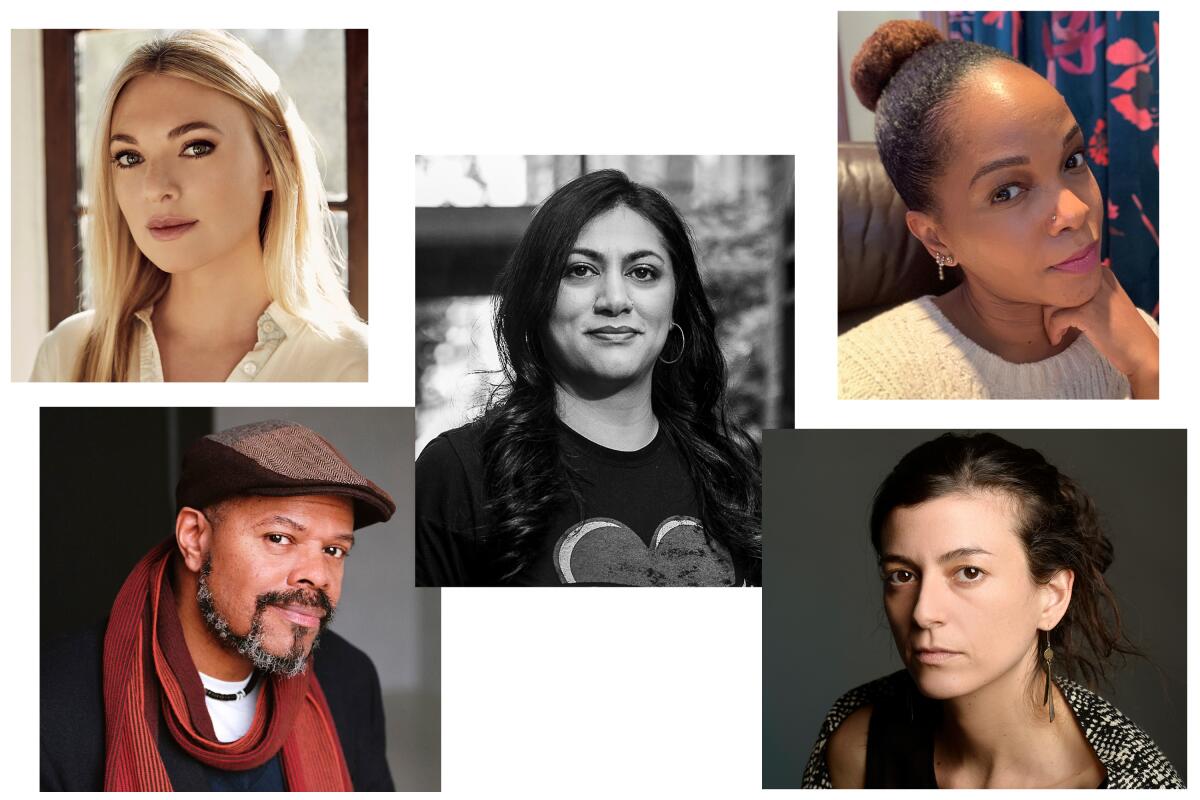
Tess Gunty and Imani Perry were the big winners at the 73rd National Book Awards, taking home honors in fiction and nonfiction, respectively, as the prestigious literary prizes were announced at a gala at Cipriani Wall Street in New York for the first time since 2019, before the COVID-19 pandemic put a pause on live events.
But the great champion of Wednesday’s ceremony — subject of speeches by lifetime achievement winners, Art Spiegelman and Tracie D. Hall, and host Padma Lakshmi — was the freedom of speech and expression in a time of book bans and violence against writers.
Gunty won for her debut novel, “The Rabbit Hutch,” a kaleidoscopic epic set in a failed Indiana industrial town; Perry was awarded for “South to America: A Journey Below the Mason-Dixon Line to Understand the Soul of Our Nation.” Among the other winners was Sabaa Tahir, for young people’s literature; Argentinian author Samanta Schweblin for translated literature; and John Keene for poetry.
Lakshmi, the “Taste the Nation” host and bestselling author, set the tone for this year’s ceremony by addressing a surge in school library bans across the country. Citing the books “And Tango Makes Three” and Spiegelman’s “Maus,” Lakshmi called censorship an attack on “our children’s 1st Amendment rights. The protection of free speech and equitable access to information and diverse ideas in the school library are fundamental to education.”
Authors Tess Gunty, Gayl Jones, Meghan O’Rourke, Imani Perry and David Quammen are on the shortlist for the 2022 National Book Awards.
Hall, winner of the National Book Foundation’s 2022 Literarian Award for Outstanding Service to the American Literary Community, is the executive director of the American Library Assn., which in September released a report on extensive book-banning throughout the U.S. After accepting the honor from presenter Ibram X. Kendi, Hall addressed “the fight for the right to read.”
After giving a “shoutout to Watts,” where she was raised, Hall dedicated the prize to her loved ones, fellow librarians and library staff who ensure that readers “have a chance to see themselves represented” in literature.
“You want everyone to have that same opportunity and you were willing to fight for it,” she added. “It is a universal truth that one of the real tests of liberty is the right to read.”
Hall concluded by reminding the audience that “free people read freely.”
Tracie D. Hall, the South L.A.-raised executive director of the American Library Association, will receive the 2022 Literarian Award.
Spiegelman, whose Pulitzer Prize-winning graphic novel “Maus” was among the books banned this year, accepted the foundation’s Medal for Distinguished Contribution to American Letters from “Sandman” author Neil Gaiman. In a speech punctuated with tongue-in-cheek asides, Spiegelman revisited the rise of his comic, a Holocaust account in which Jews are mice and Nazis are cats, and the way its censure is part of a larger movement to dismiss the experiences of marginalized communities.
“Most of today’s attacked books — many of them graphic novels — deal with queer identities and America’s race issues,” he said. “‘Maus’ deals in granular detail what my parents experienced as Jews in Nazi Europe, but I think it became a universal symbol for all murderous othering.”
Pulitzer Prize winner Art Spiegelman has denounced the ‘absurd’ removal of his graphic novel ‘Maus,’ about the Holocaust, from school libraries.
Though Spiegelman recalled being overshadowed for years by the one book that made his reputation, he had come around to embracing his 1991 classic — especially now, “while fascist storm clouds gather together to gather yet again, all over our frying planet. So I’m even grateful that ‘Maus’ may now have an afterlife as a cautionary tale, that it might make readers insist never again in the future — even if the past for other minorities has often been a matter of never again and again. And again.”
Much as it served as a platform for veterans of literary culture wars, Wednesday’s ceremony, which was also streamed live on YouTube, focused in its prizes on fresh voices in literature.

Accepting a prize for her young-adult novel “All My Rage,” San Francisco Bay Area author Tahir noted that she is the first Muslim and Pakistani American woman to take home the award in the ceremony’s decades-long history. In a tearful speech that seemed to allude to protests in Iran, she said her fellow “Muslim sisters ... are fighting for their lives, their autonomy, their bodies and their right to live and tell their own stories without fear. Sisters, may you rise and may you be victorious against the oppressors.”
Schweblin and translator Megan McDowell won for “Seven Empty Houses,” a short-story collection. In a preview of the book, The Times wrote that Schweblin helps “us reconsider what stories can be while always making them feel tense, uncomfortable, exhilarating.”
The latest from Ling Ma, Yiyun Li, Russell Banks and Namwali Serpell as well as exciting newcomers round out our critics’ most anticipated fall books.
Poetry winner Keene, honored for “Punks: New & Selected Poems,” dedicated his award to his ancestors and generations of Black LGBTQ writers — especially those who died of HIV/AIDS in the 1980s. He also voiced support for librarians, fellow writers speaking against “political censure and oppression” and social activists.
In a lyrical speech accepting her nonfiction prize, Perry paid tribute to her roots all across the country, including in Georgia, Tennessee and Mississippi — the region covered in her memoir-inflected award-winning history. The author promised to remain truthful and “bear witness to the best of my ability.” After listing all those for whom she writes — “for the sinned against and the sanctifying” — Perry called for unity in difficult times:
“We may write in solitude, but we labor in solidarity. Community is never easy, but absolutely necessary. Let us meet the challenges of a broken world together, making intercessions with love unbound and heart without end.”
The writer and Princeton scholar on “South to America,” her personal and historical tour of the region, and why so many liberals are wrong about it.
Similarly, “The Rabbit Hutch” author Gunty, who received the night’s final award, closed out the ceremony on a note of brightness.
“I truly believe that attention is the most sacred resource that we have to spend on this planet,” she said. “And books are perhaps one of the last places where we spend this resource freely and where it means most.”
She added: “I think kindness wins, I think that’s the point of this evening. Love wins.”
Tess Gunty’s novel, “The Rabbit Hutch,” follows a brilliant, troubled young woman and charts American decline. The writer’s journey is another story
Here is the list of the 2022 National Book Award winners and finalists:
Fiction
- Tess Gunty, “The Rabbit Hutch”
- Gayl Jones, “The Birdcatcher”
- Jamil Jan Kochai, “The Haunting of Hajji Hotak and Other Stories”
- Sarah Thankam Mathews, “All This Could Be Different”
- Alejandro Varela, “The Town of Babylon”
Nonfiction
- Meghan O’Rourke, “The Invisible Kingdom: Reimagining Chronic Illness”
- Imani Perry, “South to America: A Journey Below the Mason-Dixon to Understand the Soul of a Nation”
- David Quammen, “Breathless: The Scientific Race to Defeat a Deadly Virus”
- Ingrid Rojas Contreras, “The Man Who Could Move Clouds: A Memoir”
- Robert Samuels and Toluse Olorunnipa, “His Name Is George Floyd: One Man’s Life and the Struggle for Racial Justice”
Poetry
- Allison Adelle Hedge Coke, “Look at This Blue”
- John Keene, “Punks: New & Selected Poems”
- Sharon Olds, “Balladz”
- Roger Reeves, “Best Barbarian”
- Jenny Xie, “The Rupture Tense”
Translated literature
- Jon Fosse, “A New Name: Septology VI-VII.” Translated from the Norwegian by Damion Searls
- Scholastique Mukasonga, “Kibogo.” Translated from the French by Mark Polizzotti
- Mónica Ojeda, “Jawbone.” Translated from the Spanish by Sarah Booker
- Samanta Schweblin, “Seven Empty Houses.” Translated from the Spanish by Megan McDowell
- Yoko Tawada, “Scattered All Over the Earth.” Translated from the Japanese by Margaret Mitsutani
Young people’s literature
- Kelly Barnhill, “The Ogress and the Orphans”
- Sonora Reyes, The Lesbiana’s Guide to Catholic School”
- Tommie Smith, Derrick Barnes and Dawud Anyabwile, “Victory. Stand!: Raising My Fist for Justice”
- Sabaa Tahir, “All My Rage”
- Lisa Yee, “Maizy Chen’s Last Chance”
More to Read
Sign up for our Book Club newsletter
Get the latest news, events and more from the Los Angeles Times Book Club, and help us get L.A. reading and talking.
You may occasionally receive promotional content from the Los Angeles Times.
